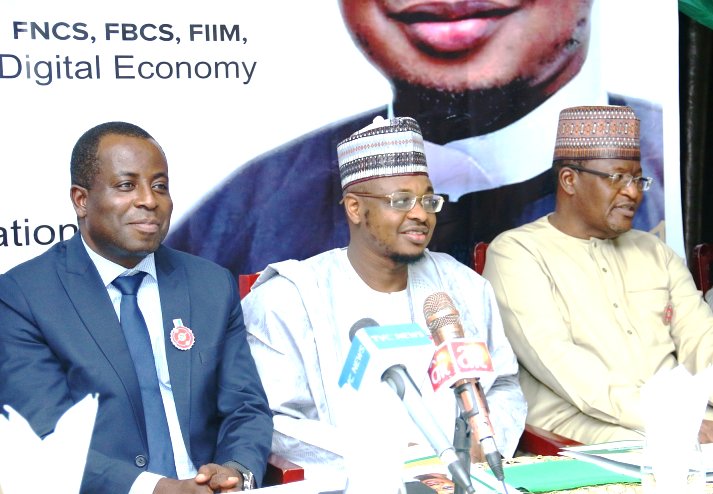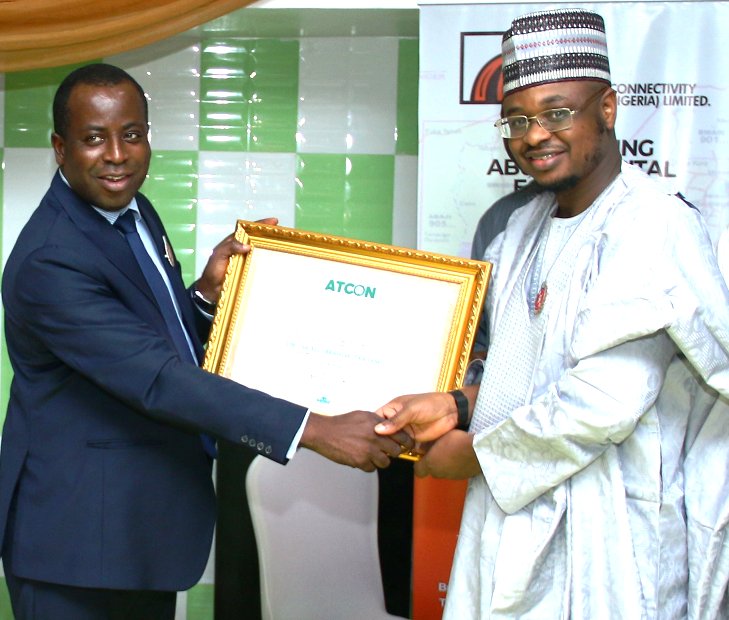Matters eRising with Olusegun Oruame
The Association of Telecommunications Companies of Nigeria (ATCON) signed off last week in Abuja with its much publicized reception in honour of the Minister of Communications and Digital Economy, Dr. Isa Ali Ibrahim Pantami. The industry came in droves; up in arms and with a list of complaints. Operators have every reason for the angst. Telecoms may be the poster child for Nigeria’s successful, albeit infant economic triumph in the last 14 years or so. But it is also the most harassed sector. ATCON had designed the event as an official meet, greet, speak, share and banter event. However, the overriding objective was how to engage dialogue and create common grounds at resolving the thorny issues in the industry.


The immediate past months have not been a rosy one between the private sector operators and the minister. Pantami had through series of directives targeting to address high cost of data, unexplainable depletion of data, and ambiguous USSD tariffs among several other issues incited both controversy and fury among the operators. At the other end of the stakeholders’ chain that rests with services subscribers, the minister had gained acceptance and support. The citizens went into joyful frenzy. You wouldn’t blame them. It would be the first time that a minister will appear to be taking decisions that favored consumers that have been at the receiving end of poor service delivery by operators.
As the directives came out from the ministry, the operators raised dust even accusing the minister of interfering with the independence of the telecom regulator – the Nigerian Communication Commission (NCC).
“ATCON appears to have read the road signs to solutions-ground better than other associations in the sector. It is in the industry’s best interest to tow its path of dialogue. Economic results … are often not a reflection of technical knowhow but strategic administration of political willpower. Teniola has his man in Pantami. He has demonstrated capacity for willpower and results at NITDA. The industry must not miss this opportunity.”
Pantami remained unrelenting; insisting that the data price floor must be crashed even while the controversy over the ambiguous pricing of USSD remained unresolved between the telcos and financial institutions.
So when ATCON finally hosted, it had its eyes on opening a dialogue channel with the minister. It had resolved that it would be better to jaw-jaw than to war-war.
Hosting Pantami had its unique attraction. He is the new sheriff at the ministry with oversight duties over every operator – every member of ATCON. This underscored the welcome remarks by ATCON’s president, Olusola Teniola that Friday evening. Like other stakeholders, ATCON recognises that it is both critical and strategic to engage policymakers in achieving desired results.
To Teniola, the dinner agenda simply hinges on “to share where the industry is currently and where they expect the industry to be after your tenure.” He would go on to assert that “ATCON would continue to advocate for changes and government intervention in a professional, mature and objective manner to protect as well as promote its members interests.”
With vast experience working within telecom companies in the UK and in Nigeria before accepting the baton to lead ATCON for the second time, Teniola carries over a decade of bruises suffered by the industry players for which government had yet to provide a balm.
But he would rather dialogue than be combative as some stakeholders would have preferred. “ATCON would collaborate and partner with the ministry to collectively resolve the obstacles working against the growth of the industry,” he told Pantami as the evening started and several policy makers stared at him inside Barcelona Hotel wondering just how the night would end.
But at the end, the event opened a new chapter in how private sector stakeholders could engage government to gain desired results.
ATCON may have found an ally not an adversary or the usual cursory listener to its problems. It came to dinner with manifold aches but ended the evening with assurance from the minister that he would resolve the issues.
‘‘I have tabled the challenges facing the sector to the Federal Executive Council and I can assure you that actions are being taken. The AGF [Attorney General of the Federation] requested me to mention facilities by name, including their locations. ‘I have also been in touch with the NSA [National Security Adviser] to resolve the issues around him. At the end of the day, we will make a difference. I am interested in getting results,” said Pantami who already has the reputation of delivering on his mandate.
It is obvious the industry can only grow by collaborations not mutual suspicion or antagonism. Government needs the continuous investments of the private sector and the robust dynamics that drive innovation within private entrepreneurship.
Private operators depend on government’s right policy frameworks and the legal defense or guaranty to continue to take business risks. Any discordance between the two stakeholders can only take the industry back and down to zero. No one will win.
Pantami didn’t mince words: ‘‘the responsibility of taking the sector to further heights does not lie on one person but on all of us. We need to get in touch when necessary. I appreciate constructive criticisms…. Anything less than this is propaganda! If criticism is propaganda, I am not intimidated. It can’t get to me. “Understand my psychology. I am one of the easiest people to interact with. I encourage us to join hands together to take the industry to a higher level. I will never lock my doors against you,” said Pantami inviting ATCON to join him in building the sector.
“When operators get clearance from federal agencies for meeting their tax or environmental obligations, they still have to contend with the monster of similar agencies at state levels. Whether in Kogi or Anambra or Akwa Ibom state, telecom infrastructures have been shut down or even vandalized not by criminals but state officials in an oddity that questions the sincerity of Nigeria’s commitment to leapfrog its economy by leveraging technology.”
In over a decade as telecoms expand its footprint across all sectors, operators have had to contend with the unsavory image of merchants who needed to be milked; not development partners who needed understanding and support.
Today, operators cry over the ‘thug-actions’ of state actors – tax, environmental, sanitation and health agencies all created in virtually all the 36 states of the federation to extort operators.
When operators get clearance from federal agencies for meeting their tax or environmental obligations, they still have to contend with the monster of similar agencies at state levels. Whether in Kogi or Anambra or Akwa Ibom state, telecom infrastructures have been shut down or even vandalized not by criminals but state officials in an oddity that questions the sincerity of Nigeria’s commitment to leapfrog its economy by leveraging on technology.
For every infrastructure violation, the consequences ultimately fall on the telecom subscribers – citizens who must pay the price to replace vandalized equipment or the more riskier cost of advanced deployment.
Some operators argue, it is ten times more expensive to produce a minute of talk or a byte of data in Nigeria than the case in Ghana or South Africa. Why? Irregular power supply forcing operators to virtually run operations including more than 39, 000 base stations nationwide on costly alternative power. The ogre of multiple taxations under which operators meet federal, state and local council taxes and plethora of levies that make operators look like convicts obligated to perpetually offset certain levies.
The challenges are more. Should we list the burden of FOREX and the increasing cases of vandalism? Operators have lived with these demons for well over a decade. But they may just have found their Mr. Fix It in Pantami. He comes with the required clout, knowledge of an industry perpetually in transition; and he has the listening ears of those at the top who will ultimately take the decisions that the sector has purred over for 14 years and more.
ATCON appears to have read the road signs to solutions-ground better than other associations in the sector. It is in the industry’s best interest to tow its path of dialogue. Economic results and any results for that matter are often not a reflection of technical knowhow but strategic administration of political willpower. Teniola has his man in Pantami. He has demonstrated capacity for willpower and results at NITDA. The industry must not miss this opportunity.































